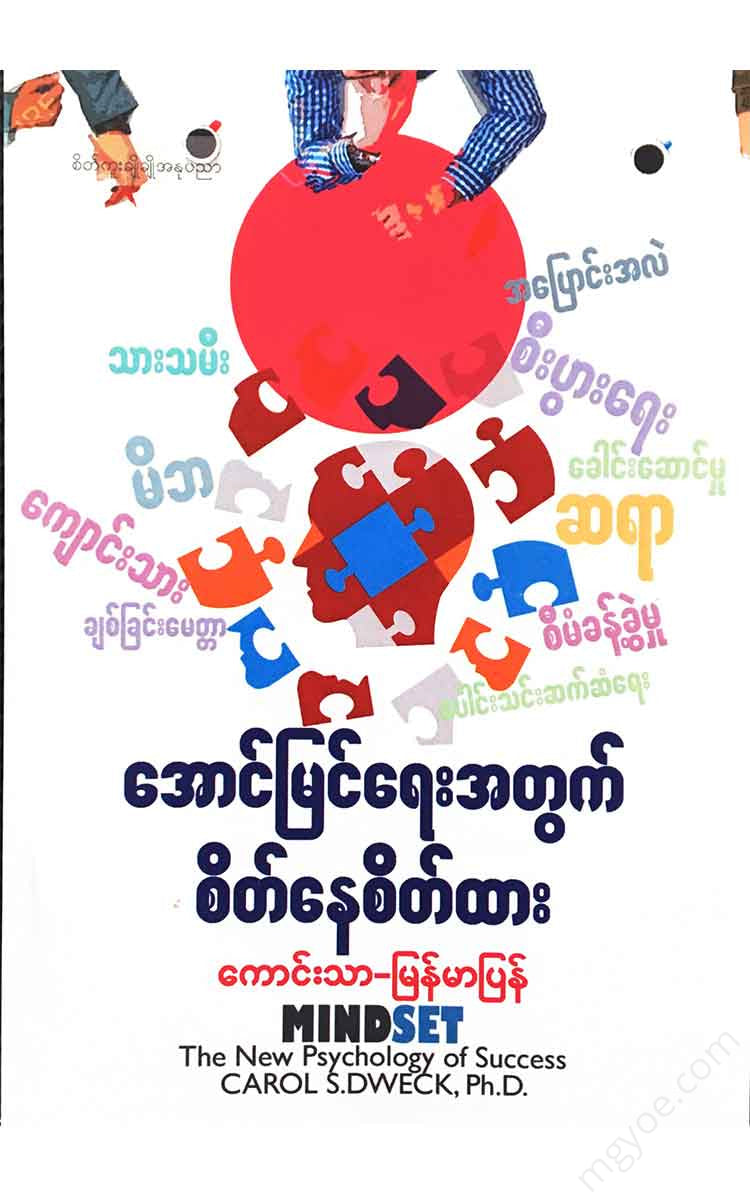စိတ်ကူးချိုချိုစာပေ
Good - A mindset for success
Good - A mindset for success
Couldn't load pickup availability
Chapter [ 1 ]
Relaxation:
When I first started out as a young researcher, something happened that would change my life. I was obsessed with how people coped with failure. I decided to observe how students dealt with difficult problems. I asked students to solve a series of puzzles. The first puzzles were easy. The next ones were harder. While the students were struggling, I was observing what they were thinking and feeling, and observing their strategies.
A 10-year-old boy rubbed his hands together and licked his tongue, shouting, “I like challenges.” Another boy, who was staring at the puzzle with a sweaty face, said with a satisfied expression, “You know what? I think I can solve it.”
I can't even imagine how different they are from most people.
Everyone has a role model. Someone who can show them the way to solve problems when they are faced with a difficult situation in their life. The two 10-year-olds above are my role models.
They understand the kind of mindset that can turn failure into a gift. They know that human qualities, intellectual skills, and things that can be cultivated with effort are what make them smart. They don't feel discouraged by failure, and they don't see failure as failure, but rather as a learning experience. If you can plan for success and avoid failure in every way possible, you can be smart. Struggles, mistakes, and perseverance are not just parts of the picture.
Why are people different?
1. The inventor of the Q, “Alfred Binet,” designed his experiment in the early 20th century while working in Paris as a Frenchman. It was designed to guide the educational programs of the public schools of Paris. He believed that educational training had the power to change the basic human intelligence. In his seminal book, “Modern Thoughts on Children,” he wrote the following:
“Few modern thinkers believe that the intelligence of the individual is a fixed quantity that can only be increased by a certain amount. We must protest against this. We must react against this cruel and destructive ideology. If we are trained, we can manage to improve our attention, our memory, our judgment in all ways, so that we can be more intelligent than ever before.
"It will increase."
Today, most experts agree on this point. Nature or nurture, genetics or environment? There will always be a trade-off between these two ideas.
Renowned neuroscientist Gilbert Goliath said that as we grow up, not only do genes and environment work together, but genes need input from the environment to function properly.
Scientists are discovering that people have a much greater capacity to learn throughout their lives, and that the brain is much more developed than previously thought. People start out with different dispositions and talents, but through experience, training, and personal effort, they can develop into different paths. The current guru of intelligence, Robert Sternberg, wrote about the central role of human intelligence in effort: “It is not a fixed set of preferences. It is a deliberate, adaptive connection.”
What does all this mean to you?
2 stops of relaxation.
Your talents are etched in stone, and the fixed mindset creates an urgency to prove yourself over and over again. If you have a certain amount of intelligence, a certain personality, a certain character, it is better to prove that those are your health remedies.
This mindset is where you can start developing your skills. A growth mindset is based on the belief that your basic skills are things that you can cultivate and develop through your efforts. People are different in many ways, but their initial talents and interests can all change and develop through experience and practice.
A person's true potential is something that is unknown and unknowable. It is impossible to predict how much they will grow and develop over the years through dedication, effort, and practice.
Did you know that Darwin and Tolstoy thought like ordinary children? Did you know that the most important photographer of the 20th century, Cindy Cummings, failed her first photography class?
You may find that qualities you want to embrace, such as confidence, can grow and develop while creating a passion for learning.
The habit of stretching yourself, even when things are going badly, is a wedding feast of growth and development. This growth allows people to thrive during the most challenging times of their lives.
A perspective on mental retardation from two perspectives.
When I ask people with fixed mindsets, they often say things like, "I'm a complete failure, like a failure," or "I'm a fool, a loser, a worthless person, a worthless person, everyone is better than me."
Look at how they think about their lives. They complain, "My life is miserable," "I have no life," "People above me will look down on me and look down on me," "Someone is destroying me," "Life is unfair. No matter what I do, it's useless," "No one loves me, there's no love. They hate me so that everyone can see."
When I ask people with developmental disabilities the same question, they say the opposite.
"I need to try harder in class."
"I need to look back and see what I did wrong in the last exam. I need to learn the lesson and pass the next exam."
These people do not give up on failure. They may feel sad and disappointed, but they quickly overcome these feelings. They overcome difficulties and obstacles.
They dare to take risks, face challenges, and persevere in their work, with no limits to their perseverance.
So, what's new?
We have many sayings about the importance of risk-taking and the power of perseverance. The saying “If you don’t get hurt, you don’t get better” captures this concept. If at first you don’t succeed, you have to try again. And don’t forget the old saying “Rome wasn’t built in a day.”
People with a fixed mindset may make excuses like, “I can't do it, I can't do it,” or “I can't hurt, I have nothing to lose.” They often become discouraged and lose energy after failing the first time.
The saying that Rome was not built in a day implies risk, suffering, and relentless effort.
The newness of human ideas has to do with their basic mindset, their growth mindset, their risk-taking, their suffering. They have to recognize the value of challenge, the importance of effort. Our research shows that these ideas come directly from growth mindsets. We teach people about this growth mindset.
You first need to understand both fixed and growing mindsets. You will see how fixed mindsets can become growing mindsets. Stone
The thoughts and actions carved in stone will grow into different thoughts, beliefs, and actions that you cultivate and nurture, pulling you in a completely different direction.
Self-insight.
Who defines your rights and limitations?
Do you observe accurately?
People with growth mindsets don't think of themselves as "Einsteins" or "Beethovens." But they see their abilities as growing and developing. They are actually more likely to be able to predict their own abilities.
It's scary. People have been shown to make huge mistakes in estimating their own performance and abilities. People with a fixed mindset are calculating with all the possible inaccuracies. People with a growth mindset are shown to be surprisingly accurate in their assessments.
To effectively study your current skills, you need accurate information. Whether your past path has been good or bad, those who are fixed in their mindset will always find themselves in a difficult situation when entering the picture of life.
Howard Gardner, author of the book "The Extraordinary Mind," concluded in his book:
“Exceptional individuals have a unique talent for identifying their own strengths and weaknesses.”
What do you have in stock?
The unique talents of the above exceptional people are:
It seems that we have the ability to bounce back from life's losses to future successes.
Specifically, people with high levels of self-confidence produce a type of perseverance and resilience.
You might ask, "A belief is something like this: love of challenge, faith in effort, and the ability to accept failure."
"We can move towards tolerance and eventually achieve greater success." We will discuss this in the next chapters.
Let your peace of mind grow.
What kind of mindset do you have? Check it out by answering the questions below.
1. Your intelligence is something you can't change much.
It's too basic.
2. You can learn new things. But
You really can't change.
3. It doesn't matter how much intelligence you have. You will always be many.
It can change.
4. No matter what kind of intelligence you have, you are always enough.
You can change it. Questions 1/ and 2/ are about fixed mindset.
Questions 3/ and 4/ are about growth mindset.
You may be inconsistent, but you can always balance things out. You may also have confidence in other abilities, such as athletic ability, academic talent, or business acumen.
You may have personal qualities, personality traits, and character traits, so answer the questions below to find out.
1. You are a type of person. You can't really change much.
2. No matter what kind of person you are, you can always change enough.
3. You can do things differently, but you can't really change the important parts.
4. Fundamental things about what kind of person you are can always change.
Questions 1/ and 3/ are about fixed mindset.
2/ and 4/ are related to growing confidence.
It is a matter of intelligence and personal integrity.
You can change your mindset.















